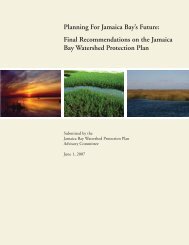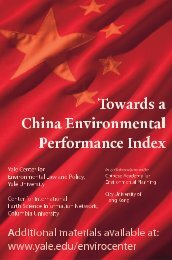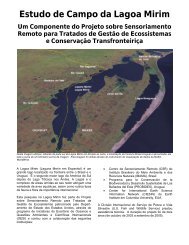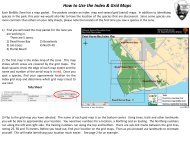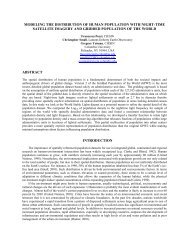In Search of Shelter - Center for International Earth Science ...
In Search of Shelter - Center for International Earth Science ...
In Search of Shelter - Center for International Earth Science ...
You also want an ePaper? Increase the reach of your titles
YUMPU automatically turns print PDFs into web optimized ePapers that Google loves.
©CARETraditionally pastoralism has represented an importantmechanism <strong>for</strong> adjusting to climate variability, since pastoralistscan move their herds along with the rainfall. 65 A symbioticrelationship <strong>of</strong>ten <strong>for</strong>med between herders and agriculturalists,with agriculturalists receiving animal manure to fertilize theircrops in return <strong>for</strong> allowing livestock to graze on plant stubble.However, as the Sahel has become more densely settled,increasingly severe conflicts over land and water resources haveerupted between pastoralists and sedentary farmers. 66<strong>In</strong> Senegal, fieldwork revealed that environmental changesnegatively affect agricultural livelihoods, and contribute tomigration through different mechanisms. For areas whereirrigated agriculture is possible, farmers living close to theSenegal River expect their way <strong>of</strong> life will continue to bepossible and there<strong>for</strong>e do not intend to migrate in the future.But in areas like the Peanut Basin, where land degradation issevere, interviewees said they plan to move away if agriculturallivelihoods do not improve. Most migrants who already migratedsaid they would return home to the countryside if agriculturallivelihoods improved. <strong>In</strong> Senegal experts observe an increasingmovement <strong>of</strong> people back to the countryside due to the globaleconomic crisis. However, that coping mechanism is runninginto counter-pressures because areas people are returning toare in many cases already degraded. Conflict over access to landseems to be increasing. 67Some farmers do manage to find alternative livelihoods thatallow them to return home. <strong>In</strong> Niger, a returned migrant fromthe village Talcho, Filingue (Tilabéri, Niger) remarked, “I losthope in producing crops, since the soil got too poor due to thedroughts. I used to be a farmer in my home town. There<strong>for</strong>e Ifirst went to Lomé (Togo) and then Libya. Now, I have decidedto return back to Niger where I will start a new business withthe money I managed to collect in Libya.” 68Rather than returning after migrating, the trend goes in theopposite direction. 69 People increasingly migrate step-by-step inpursuit <strong>of</strong> environments that will support them. The residents <strong>of</strong>the village Caré in the Tilabéri region <strong>of</strong> Niger is now home tomigrants from another village called Farka where soil degradationhas made crop cultivation impossible. A migrant remarked:“We were farmers in Farka, but the production level worsenedtoo much and the harvest got completely unreliable due to therain fall shortage and soil degradation. We had no alternativerevenues. There<strong>for</strong>e, we had to flee this village in the year1987…there is no other reason why we left the original village;if this deterioration in the land quality had not happened, wewould have stayed. Currently in Caré we are suffering from similarproblems and might there<strong>for</strong>e leave the village <strong>for</strong> another aswell. We have never planned to leave, but we just ´crept´ afterour living.” 70<strong>In</strong> another study in Burkina Faso, researchers found that peoplefrom drier regions are more likely to migrate temporarily andto a lesser extent permanently to other rural areas (rural–ruralmigration), compared with people from wetter areas. A rainfalldeficit increases the rural-rural migration but decreasesmigration to abroad. No rush to cities has been observedduring periods <strong>of</strong> drought. 71 A fisherman in the village <strong>of</strong> Sirba(Tilabéri, Niger) recounts, “I have been suffering from therain water shortage which made the river very shallow anddecreased my fish production, which had negative implicationson my income. If the situation does not improve, I might leave<strong>for</strong> another country like some <strong>of</strong> my friends and relatives did;they left <strong>for</strong> Nigeria and Burkina Faso and settled there.” 72Studies in other regions support this finding, and suggestthat environmental conditions <strong>of</strong>ten play a more direct rolein short-term moves rather than long-term ones. 73 And yet,if environmental changes render “home” unlivable, shorttermmigration can develop into a pattern <strong>of</strong> creeping onwardmovement.Robert Ford <strong>of</strong> the Centre <strong>for</strong> GIS Training and Remote Sensing,National University <strong>of</strong> Rwanda noted, “Those <strong>of</strong> us living withthese issues here in Africa are already seeing some majormovements <strong>of</strong> people. <strong>In</strong> many parts <strong>of</strong> Africa, people livingon the margin seem to quickly pick up signals that indicatewhether on balance life is better by going to the city orreturning to the land. That this much ferment is happeningnow, be<strong>for</strong>e climate change really hits, tells me that we hadbetter get prepared.” 7410



